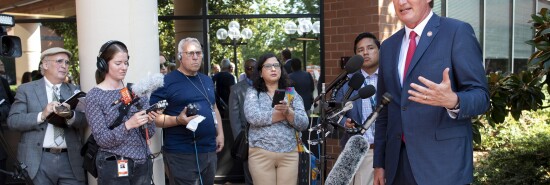
School chief in transgender rape case lied, but is that a criminal offense?
Quin Hillyer
The First Amendment applies even to low-life liars.
For that reason, one of the criminal counts against Scott Ziegler, the school superintendent of Loudoun County, Virginia, probably ought to be dismissed, and the Virginia statute on which it is based probably should be declared unconstitutional.
LOUDOUN COUNTY GRAND JURY INDICTS OUSTED SUPERINTENDENT
Granted, some of us experienced justifiable schadenfreude at the news that Ziegler, who inexcusably mishandled a sexual assault incident perpetrated by a cross-dressing boy in a girls’ bathroom, has been fired and indicted. Ziegler’s behavior in the case, which played a big role in the 2021 Virginia elections, was reprehensible. Ziegler reportedly was told of the assault the day it happened, but he said at a public school board meeting a month later that he did not know about it. The only punishment he meted out to the assailant was to transfer him to another school, where he reportedly sexually assaulted yet another girl. He also allegedly pressured school employees to help cover up the truth.
The school board, which itself acted reprehensibly regarding the situation, finally fired Ziegler, and on Monday, a grand jury indicted him on three misdemeanor counts. Perhaps the other two counts — for “prohibited conduct,” which is rather vague, and for “penalizing an employee for a court appearance” — will stick, but the first count is problematic. It alleges that he committed the misdemeanor of “false publication,” which aims to punish “any person who knowingly and willfully” gives a “false or untrue statement” to a member of the media for purposes of publication or broadcast.
On its face, this statute appears unconstitutional. It almost surely violates the free speech protections of the First Amendment. Yes, courts have recognized that the amendment never protected libel or defamation from being punished, and there also is an exception for direct verbal threats and for fraud. Aside from that, though, the amendment protects free speech, including lies, from government penalty. This protection applies to lies told to the media just as much as it does to fibs about dogs eating homework.
If this law stands, then every time a politician shades the truth to a reporter, he would face the possibility of jail time. So, too, for every athlete who has contempt for an opponent but who tells a sports columnist that of course he respects the adversary.
Everyone should be able to recognize the dangers of this law without at all justifying dishonesty. The First Amendment doesn’t approve of duplicity; it just relies on the culture, on people in their private capacities, to deal with the deceit rather than involving the heavy hand of government. We do not imprison the celebrity divorce lawyer for telling TV cameras that his philandering client is a paragon of virtue.
So, yes, Mr. Ziegler appears to deserve being fired, and maybe he deserves prosecution for the other two offenses. A jury can decide those issues. Still, the “false publication” charge should be thrown out, and someone surely should challenge the constitutionality of Virginia Code § 18.2-209.
CLICK HERE TO READ MORE FROM THE WASHINGTON EXAMINER
